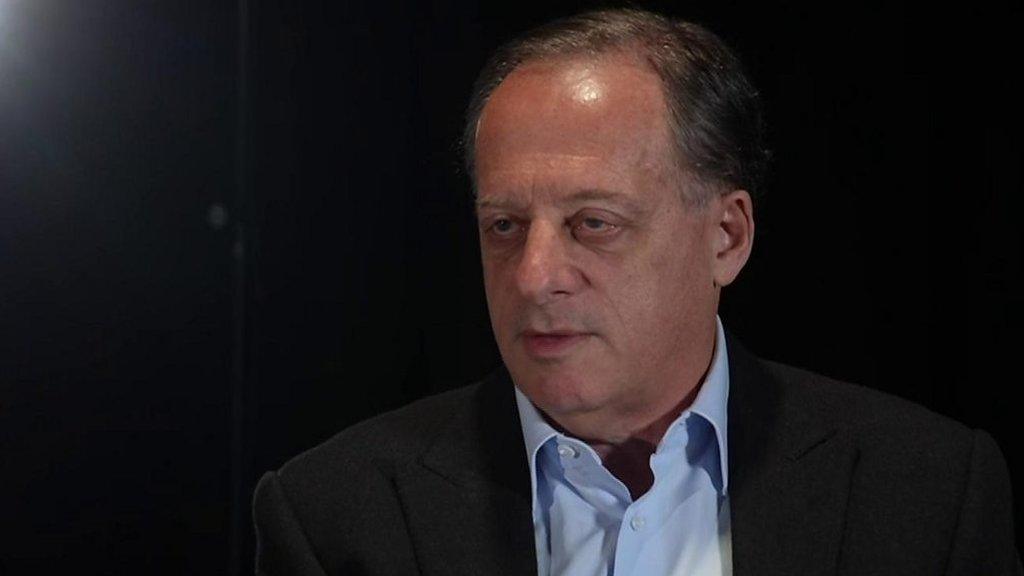Richard Sharp: BBC chairman faces fresh calls to resign
- Published
Watch: Richard Sharp says he is "confident" appointment was on merit
Richard Sharp is facing renewed pressure to stand down as BBC chairman.
Jonathan Dimbleby and Baroness Wheatcroft have joined a growing chorus of voices questioning his position.
Mr Sharp is facing criticism for his role in facilitating a £800,000 loan for then-prime minister Boris Johnson.
An MPs' committee said Mr Sharp made "significant errors of judgement" in doing so while applying for the BBC job. He insists he got the job on merit.
On Monday Rishi Sunak declined to say if he had confidence in Mr Sharp, and instead said he would wait for the outcome of an inquiry ordered by the commissioner for public appointments.
Mr Sunak's official spokesperson, when later asked directly if the prime minister had confidence in Mr Sharp, said: "Yes, we are confident the process was followed," adding: "But there is a review into this process and we will look at that carefully."
Veteran BBC broadcaster Mr Dimbleby told BBC Newsnight: "What [Mr Sharp] should do honourably is fall on his sword."
"I have no doubt that he was appointed on merit on the basis of the available facts," he said. "The issue is simply about transparency and accountability."
He warned the credibility of the corporation in the public's view was at stake, adding "the BBC needs this like it needs a hole in the head".
Crossbench peer Baroness Wheatcroft, who sits on the Lords Communications and Digital Committee, said it was "impossible" not to agree with Mr Dimbleby's position.
"Even if Mr Sharp behaved absolutely correctly, it doesn't look right, it doesn't smell right, and it doesn't feel right for the BBC to have a chairman who is now being questioned about his judgment," she told BBC Radio 4's Today programme.
"It may be the sort of thing that happens all the time in the circles that Mr Sharp moves in, and it may be that £800,000 is just chicken feed as far as he is concerned, but to most people who love the BBC £800,000 is a massive sum," she added.
"He did a favour for a prime minister who was in need at a time when the prime minister was being asked to do Mr Sharp a massive favour and grant him one of the plum jobs in British broadcasting."
Sir David Normington, ex-commissioner for public appointments, told BBC Radio 4's World at One that the situation was "very damaging".
Between 2011 and 2016 the retired civil servant was responsible for monitoring government appointments of chairs and non-executive directors of public bodies or members of advisory committees.
He said: "It's damaging Mr Sharp, it's damaging the BBC and the government and more important - it's undermining public confidence in the appointments system."
He explained that ministers were free to appoint friends and donors and called for more independent scrutiny of appointments.
"It should be the [independent] panel that is responsible for putting forward the names of people who are best suited for that role - and I don't think that happens at the moment."
The role of BBC chair is appointed by the government and includes upholding and protecting the BBC's independence and ensuring the BBC fulfils its mission to inform, educate and entertain, among other things.
BBC News has contacted Mr Sharp and all other BBC board members for comment.
Labour and the SNP have suggested that Mr Sharp's position is untenable.
A report published by the Digital, Culture, Media and Sport Committee on Sunday concluded that Mr Sharp should not have become involved in facilitating the loan while applying for the BBC job.
A 'sort of introduction agency'
Mr Sharp acted as a "go-between" for Sam Blyth, Canadian millionaire and distant cousin of Mr Johnson, who had said he would be willing to act as guarantor on the loan after learning the then-prime minister was in financial difficulty.
Mr Sharp, who was working as a Treasury adviser at the time, approached Simon Case, the country's most senior civil servant, to arrange a meeting between the pair.
The report found Mr Sharp should have disclosed his knowledge of the talks as potential conflicts of interest during his BBC application.
Mr Sharp insists his involvement in the matter ended with that single meeting, despite admitting he met socially with Mr Johnson and Mr Blyth at Chequers months later.
Last week he told MPs he "didn't arrange the loan" but did not refute acting as a "sort of introduction agency".
He admitted the affair had embarrassed the BBC but insisted he had "acted in good faith to ensure that the rules were followed".
Related topics
- Published24 January 2023
